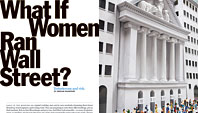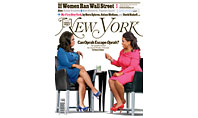
1. Financiers and feminists argued last week over Sheelah Kolhatkar’s story speculating on whether the banking crisis had a biochemical root—namely, the testosterone-fueled risk-taking of a male-dominated Wall Street—and whether an injection of estrogen may be able to fix it (“What If Women Ran Wall Street?,” March 29). Go-to outlets for financial news, such as the Financial Times and Wall Street Journal blogs, gave it a hat-tip, and the New York Times recommended it as their “Idea of the Day” last Wednesday. Many women bloggers took pleasure in the gender flip-flop of the hormonal cliché, including Hanna Rosin at Double X, who noted, “These studies sure are satisfying. For one thing, the old idea of men and markets on the side of the rational and women on the side of emotionalism takes a blow. For another, testosterone seems to be the new cultural hormone, and I look forward to the day a woman can say to her husband, ‘Honey, are you having one of your surges again?’ ” Others tempered their satisfaction with concerns about promoting old stereotypes. “Given the havoc that rogue traders have wrought on our world economy, it’s hard not to take it as a compliment when pundits suggest that things could have been better, if only we’d left the women in charge of the castle,” wrote Amy Benfer at Salon’s Broadsheet. “But the idea that women are kinder, gentler, less likely to gamble away the rent money is ancient, and has rarely helped us much. Keep your woman as totem of moral superiority. Me? I’m fine with another flawed, fascinating Nancy Pelosi or Hillary Clinton.” Not everyone was so eager to blame the biochemistry. “When times are good, no one attributes that to the fact that 90 percent–plus of the traders are men. So blaming the maleness of those traders when the market busts when you’re not also willing to credit their maleness when the market booms is a form of hate-male,” argued a commenter on nymag.com. And Jesse Ellison at Newsweek’s Human Condition blog advocated for nullifying the gender question altogether: “It’s not a question of whether men or women should be in charge of Wall Street or anywhere else for that matter. It’s a bad idea for any industry to be so wildly out of whackin terms of gender balance. It’s been proved time and again that gender balance is good not just for people but for the bottom line. Kolhatkar describes efforts to get men to behave more like women … Wouldn’t it be more logical to focus on establishing a balance so that everyone can act like themselves?”

2. With the end of The Oprah Winfrey Show on the horizon, Robert Kolker scrutinized whether the talk-show star can successfully transfer to a new project—the much-delayed Oprah Winfrey Network—and how much of her old persona she can afford to leave behind (“The O in Network,” March 29). The L.A. Times blog Company Town recommended it, noting that the article “provides good background on how the channel came to be and the questions about it.” Other readers delved into what the change might mean for Oprah herself, and whether it would be successful. “To preserve that talk-show identity could be professional death,” notes the blog Jane Genova. “As we viewers know, that show has been getting stale for a while. The ratings reflect that lack of freshness. Oprah might have been getting out at the right time. But who will the Oprah be who puts her imprint on Discovery? The issue is whether Oprah wants to change.” But if the commenters on nymag.com were any indication of Winfrey’s durability among her fans, she’s likely to survive the transition intact. “Pretty much everything Oprah touches turns to gold,” wrote one commenter. “I have no doubt OWN will be entirely compelling, entertaining, and insightful. Perhaps the network will take a few years to come into its own, as her own talk show certainly did, but the inaugural lineup sounds absolutely wonderful.”
3. Asra Q. Nomani’s essay on the factors that turn people toward extremism (“Jihad Wannabes,” March 29) inspired lively debate on nymag.com. Many applauded Nomani for taking a measured view of the situation. “It is worthwhile for Muslims to think about the social ills of radicalization within the faith,” wrote one commenter, “just as it is worthwhile for Christians and every other religion to do the same.” Another echoed that sentiment, noting, “The fact is, we have some serious problems in our ummah [community] and I have seen more than one masjid fall under the influence of the propaganda of hatred and exclusion. At least Nomani is brave enough to identify this creeping radicalization that is plaguing our mosques and honest enough to avoid engaging in the usual apologetics.” Others argued that it was a social problem outside religion. “Interesting read, although the solution is too simplistic. We live in a militaristic society that enables people to become jihad wannabes, but this is also what enables people to join the military or law enforcement (I know that’s partly why I joined the Marines). People do this in part to live out their fantasy as the hero. What differs is who the hero is in our eyes—which side is good and which side is evil.”
Send correspondence to: [email protected]